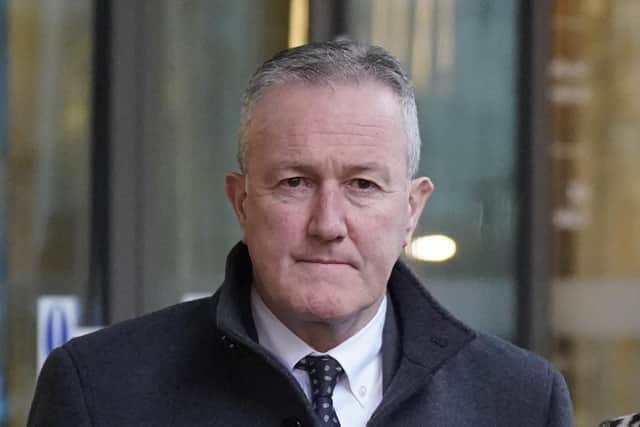Sinn Fein says it is open to reform on ability to block powersharing at Stormont
and live on Freeview channel 276
The Economy Minister said his party recognised that the veto was a “continued problem” and was keen to find agreement with other parties to reform the structures.
Mr Murphy said the Stormont’s Assembly and Executive Review Committee was the appropriate forum to initiate the process and “test the mettle” of other parties in regard to making changes to aspects of the Good Friday Agreement.
Advertisement
Hide AdAdvertisement
Hide AdHis comments came amid calls from the Irish government for reforms to be examined ahead of the next Assembly election.


Tanaiste Micheal Martin has insisted that never again should one party in Northern Ireland have the power to collapse powersharing.
The Stormont institutions incorporate a system based on mutual veto powers, enabling blocs of unionist and nationalist MLAs to stop moves that otherwise command majority support and, in extreme circumstances, pull down the institutions and prevent them operating.
The DUP exercised its veto to blockade Stormont for two years in protest at post-Brexit trading arrangements.
Advertisement
Hide AdAdvertisement
Hide AdThe ending of that boycott enabled devolution to return earlier this month.
In 2017, Sinn Fein collapsed the ministerial executive amid a furore about a botched green energy scheme.
It was down for three years.
The SDLP, the Assembly’s official opposition, has called on the DUP and Sinn Fein to commit to never again collapse the ministerial executive.
Mr Murphy was pressed on the issue during an interview on BBC Radio Ulster on Thursday.
Advertisement
Hide AdAdvertisement
Hide AdHe insisted Sinn Fein was in the executive to stay and had “absolutely no intention of walking out”.
“We are also quite happy to look at the arrangements, as we’ve said all along, to look at the arrangements to try and prevent that (collapse) happening again,” he said.
On reforms to prevent any one party preventing an executive being formed, he added: “We’re very happy for that to be tabled, to be discussed and an agreement sought among the parties and in relation to that.
“We said all along that the place to resolve the issue where a party could bring down the executive was within a functioning assembly, that’s where it needed to be resolved.
“There is an Assembly committee set aside to do this.
Advertisement
Hide AdAdvertisement
Hide Ad“We’re quite content for those issues to be brought there and to try and secure the agreements that are necessary to change the arrangements in the Good Friday Agreement, because this isn’t simply a matter of a stroke of a pen, these are arrangements in the Good Friday Agreement, which need consideration, dialogue and consent to bring them through and we’re quite happy to be part of that process.”
Asked if his party was up for change, he replied: “Yes, absolutely.
“We’ve always said that, prior to the Assembly going back, we’ve always said that.”
He added: “We do recognise that it is a continued problem.
“We’re quite happy to sit down with others and try and resolve that.”
Advertisement
Hide AdAdvertisement
Hide AdMr Murphy emphasised that the discussions on the issue had not yet commenced.
“We haven’t got into the room to test the mettle of everyone in relation to that.”
On a visit to Belfast on Wednesday, Mr Martin reiterated his case for reform to be considered.
He expressed concern at how often the executive had been in cold storage since the 1998 Good Friday deal.
Advertisement
Hide AdAdvertisement
Hide Ad“I think over the lifetime of the agreement it has been down as often as it’s been up and that’s a problem,” he told reporters at Ulster University.
“And I think we can’t go blindly into the next Assembly elections without endeavouring to rectify some of those issues, which I think can be done.
“And I think there should be discussions around that.
“And some parties will want that, and I support that.”
Asked about the calls for reform last week, DUP deputy First Minister Emma Little-Pengelly said the best way to ensure stability of the institutions in Northern Ireland was by fostering strong working relationships between the parties within the administration.